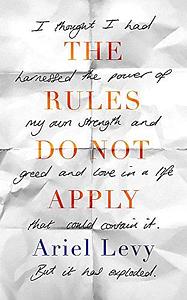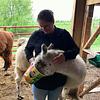Take a photo of a barcode or cover
I'm torn. I loved the writing style, the prose, the cadence. I loved the adventures and the themes around womanhood, motherhood, femininity, and societal rules. What I did expect, however, was an inspiring book about how you can break all the rules. You do get that for about half of the book. Then it dramatically and unexpectedly shifts into the tired, age-old narrative that most of us are so, so tired of that "you can only experience unconditional love if you have a baby" and "are you lonely? Have a baby!" And I felt duped and disappointed. Wasn't this supposed to be about breaking rules, not about another jab that simply existing as a woman is unfulfilled without forcing the expectations of endless love on a fetus and then a child?
I liked this book, but I think mainly for the writing style, the beginning half, and the few lines that really hit home. I would still recommend it but with a grain of salt. I do believe that women who have had miscarriages may be triggered, but also healed a bit, from the text.
I liked this book, but I think mainly for the writing style, the beginning half, and the few lines that really hit home. I would still recommend it but with a grain of salt. I do believe that women who have had miscarriages may be triggered, but also healed a bit, from the text.
medium-paced
The preface of this book is misleading. Ariel Levy talked about losing her son. Her spouse. Her house. Then the memoir begins and we're at the beginning of her professional writing career. Don't get me wrong, she's an amazing writer with amazing stories, but by the time she finally got to what she alluded to at the very beginning, I felt like she exaggerated the facts in order to get people to pick up her book. I'm not going to lie; that's why I downloaded the audiobook from Over Drive. I expected a story of human strength and resilience. Does that mean her experience wasn't tragic? No, but the wording she chose to explain what happened, from someone who makes her living from words, was odd.
Honestly from the prologue, you'd think that whatever happened in Ariel Levy's life was a lot more sinister than what the story actually turned out to be. A normal life, heartbreak, adventure, more heartbreak, stress over figuring out who she was.
There were a few good gems of take aways here: "Living in grief"; "Not everybody gets everything".
I do believe/agree that she was foolish and selfish traveling to Mongolia - 5 months into a high-risk pregnancy- but there's a lesson there in tragedy and allowing yourself to let go.
At 200 pages this was a story that gave you insight into someone else's life, their thoughts, their struggles and their experience, and listening to someone's story that is different than yours is advantageous in understanding the human experience and expanding our bounds of empathy, compassion and understanding.
There were a few good gems of take aways here: "Living in grief"; "Not everybody gets everything".
I do believe/agree that she was foolish and selfish traveling to Mongolia - 5 months into a high-risk pregnancy- but there's a lesson there in tragedy and allowing yourself to let go.
At 200 pages this was a story that gave you insight into someone else's life, their thoughts, their struggles and their experience, and listening to someone's story that is different than yours is advantageous in understanding the human experience and expanding our bounds of empathy, compassion and understanding.
the rules do not apply, by Ariel Levy, contains some good writing and some privileged ideas that she has to go through great pain and sadness to learn do not apply. She grew up expecting she could do it all and have everything, a white privileged woman, but learns this is not possible. The problem is she blames her expectation on feminism, which is faulty from the start. It is more her privileged status that gives her this belief.
She's a good writer, New York Times stock, so it's an easy read and she nails the pain when she has her baby prematurely. Of course she chose to leave her home to take a work assignment in Mongolia in November five months into her pregnancy. What could go wrong? A lot. She had some pains she noted and ignored, she believed her doctor that taking a plane was fine. That is standard medical advice, but traveling thousands of miles to a work assignment in a rural country to travel into the bush to do interviews, she was lucky she was still in the city when the baby came, a premie, who would not survive, and that she had connections who gave her the name of a doctor who spoke English, and who was there for her despite the timing being not during work hours. Lucky or privileged in a position of power from her job and connections? What normal pregnant woman would have access she did? She had something called placental abruption, a rare problem that women with high blood pressure can get, or older women (and cocaine users, which she was not), in her case it was most likely because she was 38.
So although I enjoyed the book and the writing was excellent I found fault. Also her denial her partner had a drinking problem when it was so obvious from the beginning of their relationship to me as a reader. How could this very smart writer not see what was right in front of her. She's in the mid-90s into the 2000s in this book and she's missed the deep meaning of feminism.
Some quotes:
"There was an unapologetic ethos of consumption in New York City, which the magizine I worked for both satirized and promoted."
"It is a very strange thing that people will give you a motor car if you will tell them a story." Virginia Woolf said in an address to the National Society for Women's Service, a group of female professionals, in 1931. "It is a still stranger thing that there is nothing so delightful in the world as telling stories."
"Daring to think that the rules do not apply is the mark of a visionary. It's also a symptom of narcissism."
"My mother knew instinctively that danger could come in a friendly box from the grocery store, full of brightly colored cereal that gets inside your body and rots you quietly from the inside out. She had inherited from her own mother the imigrant's mistrust for authority, and combined it with insurrectionary tendencies left over from her days as a student radical, and what it all added up to in the kitchen was a ban on Cheez Doodles."
"A real editor isn't just someone you work with; he's your guide. He sees your brain doing its thing and learns its weaknesses and abilities, and if he's really good, he figures out what you need to hear to compensate for the former and accentuate the latter. He is the person you trust with the most intimate thing you have, your own voice."
She's a good writer, New York Times stock, so it's an easy read and she nails the pain when she has her baby prematurely. Of course she chose to leave her home to take a work assignment in Mongolia in November five months into her pregnancy. What could go wrong? A lot. She had some pains she noted and ignored, she believed her doctor that taking a plane was fine. That is standard medical advice, but traveling thousands of miles to a work assignment in a rural country to travel into the bush to do interviews, she was lucky she was still in the city when the baby came, a premie, who would not survive, and that she had connections who gave her the name of a doctor who spoke English, and who was there for her despite the timing being not during work hours. Lucky or privileged in a position of power from her job and connections? What normal pregnant woman would have access she did? She had something called placental abruption, a rare problem that women with high blood pressure can get, or older women (and cocaine users, which she was not), in her case it was most likely because she was 38.
So although I enjoyed the book and the writing was excellent I found fault. Also her denial her partner had a drinking problem when it was so obvious from the beginning of their relationship to me as a reader. How could this very smart writer not see what was right in front of her. She's in the mid-90s into the 2000s in this book and she's missed the deep meaning of feminism.
Some quotes:
"There was an unapologetic ethos of consumption in New York City, which the magizine I worked for both satirized and promoted."
"It is a very strange thing that people will give you a motor car if you will tell them a story." Virginia Woolf said in an address to the National Society for Women's Service, a group of female professionals, in 1931. "It is a still stranger thing that there is nothing so delightful in the world as telling stories."
"Daring to think that the rules do not apply is the mark of a visionary. It's also a symptom of narcissism."
"My mother knew instinctively that danger could come in a friendly box from the grocery store, full of brightly colored cereal that gets inside your body and rots you quietly from the inside out. She had inherited from her own mother the imigrant's mistrust for authority, and combined it with insurrectionary tendencies left over from her days as a student radical, and what it all added up to in the kitchen was a ban on Cheez Doodles."
"A real editor isn't just someone you work with; he's your guide. He sees your brain doing its thing and learns its weaknesses and abilities, and if he's really good, he figures out what you need to hear to compensate for the former and accentuate the latter. He is the person you trust with the most intimate thing you have, your own voice."
This book is as good as everyone says, or it’s better.
The story of an upperclass white lady with upperclass problems who is shocked when terrible things happen to her because she grew up believing she would have a perfect life only to find out she can't control everything.
"After I bought a test I found a Starbucks and stood in the sticky bathroom, overwhelmed by excitement and the mingling sense of urine and macchiato while I waited for the little lines to appear in front of me on the litle stick. And then there they were: plus. It was like magic. A little eye of newt in my cauldron and suddenly I was a witch with the ability to brew life into being."




